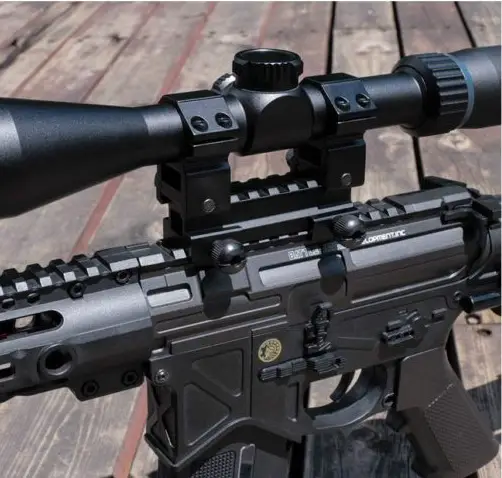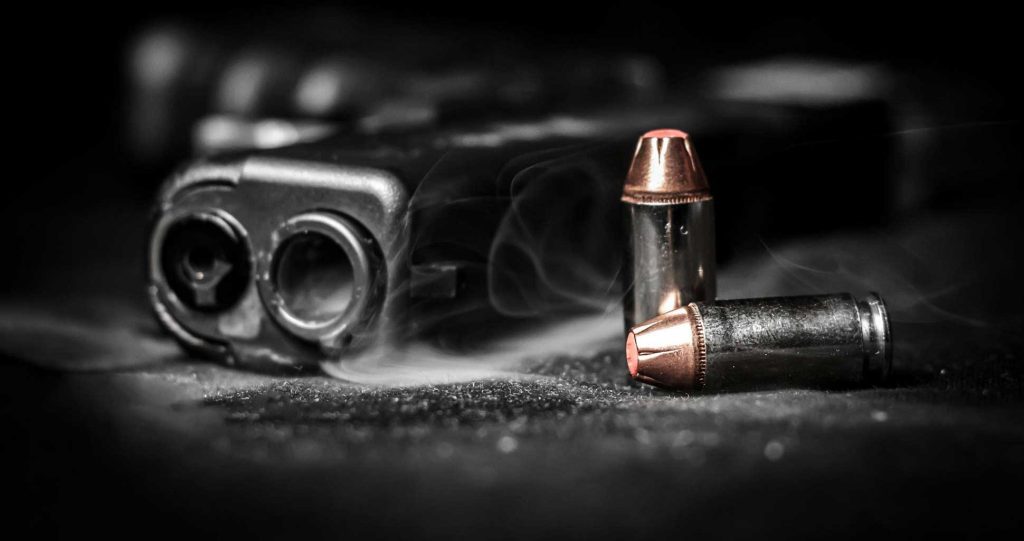
What is the Best Self Defense Caliber?
A gun is only as effective as the bullet inside of it and knowing what caliber to use with your firearm is the easiest way to ensure success with every shot.
There’s a lot of debate that occurs when it comes to choosing the right caliber for a self defense weapon, and it’s likely the most important decision you’ll have to make when choosing a gun.
So, what is the best self defense caliber?
Some of the more popular rounds used for these types of guns are 9mm, .380, .40, 357 Mag, and 12 gauge, depending on the type of gun you use and what you’re accustomed to using.
Each has pros and cons, as well as ratings in things like power and speed, so there’s no single caliber that can do it all.
The most important thing when determining the best self-defense caliber is what you feel comfortable with as the person holding the firearm.
With that in mind, we’ve rated some of the more popular choices in rounds for this purpose so you can see how they differ and what’s the best fit.
What Are the Best Self Defense Calibers?
Just about any caliber of a firearm could be used self defense in one way or another, but that doesn’t mean they should be.
These are some of the most popular rounds used in self defense weapons and how they rate in accuracy, power, and speed, to give you a better understanding.
#1 9mm
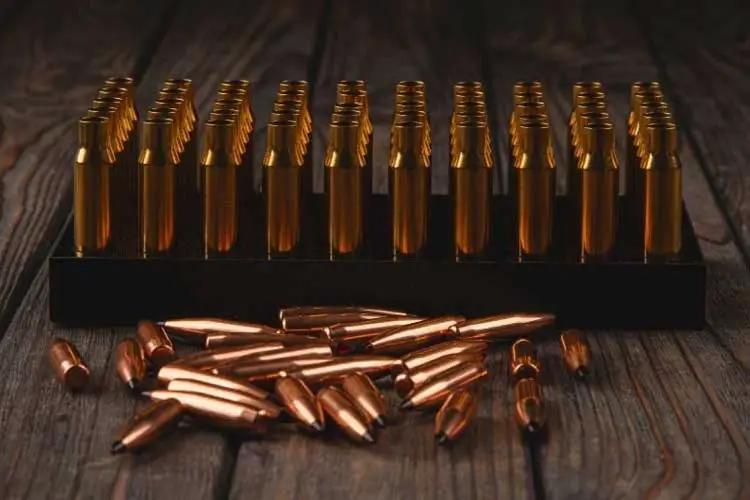
When you’re counting down the best calibers for self-defense, there’s a good chance the 9mm luger will be at the top of the heap.
There was once a time when the 9mm was considered the less-than cartridge for those who didn’t want something as powerful as the .45 ACP, but given what we know now, it’s actually better at penetration and with lower recoil.
Accuracy
The accuracy of a bullet isn’t only determined by its caliber, but the shooter’s skills and the conditions.
However, when judging a 9mm for accuracy on its own, these rounds are capable of being accurate up to around 50 yards which should be enough in a self-defense situation.
Power
A good self-defense gun should be able to stop an attack in mere seconds and without having to fire more than one shot.
This is one area that the 9mm excels in, even though it has a smaller bullet because it’s got a lot of speed and is able to penetrate deeper.
When looking at standard pressure measurements, a 9mm is capable of producing 365 foot-pounds of force, when using a 124-grain bullet.
In comparison to other popular calibers, it’s one of the best in terms of muzzle energy, which results in a more powerful hit with the hopes that you only have to take one.
Speed
The speed of a 9mm Luger depends on a few factors, including the type of firearm that it’s chambered for.
However, the consensus is that a standard 9mm bullet will be able to travel around 1500 feet per second, and if it’s able to travel without penetration, it’ll be around 2,500 yards before it hits the ground.
#2 .380
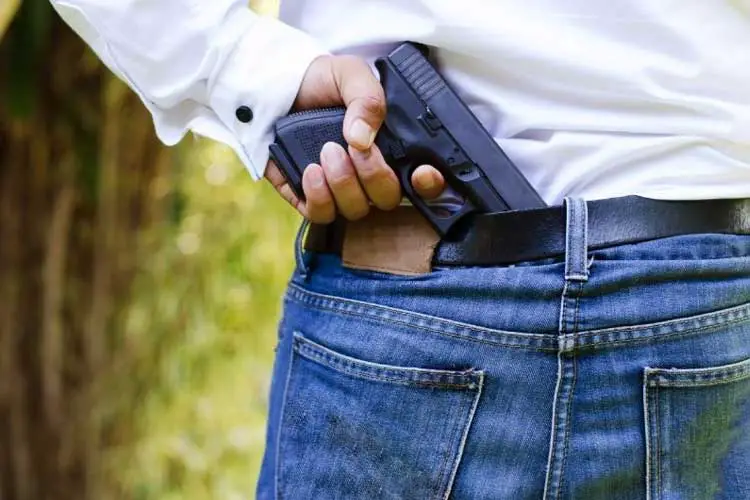
The .380 might not be the first thing that springs to mind when you’re thinking of a self-defense gun, but they’re a lot better than people give them credit for.
These smaller rounds and perfect for compact guns, and they’re lightweight but easily accessible which are both benefits when you’re trying to defend yourself.
Accuracy
One of the key definers of a gun’s accuracy is its recoil and the .380 is known for being pretty minimal in this regard.
If the cartridge produces minimal recoil, you’ll be able to shoot more rounds faster and more accurately, which.
Makes the .380 a smart choice in this regard. When you only have one shot to take, an accurate caliber is worth its weight in gold.
Power
The power of penetration is still reasonable for a .380 even though it has a weakling reputation.
If you’re using some sort of expanding ammunition then it will do a great job of penetrating and leaving a large wound cavity, even when fired from a smaller gun.
However, when compared to something like a 9mm, the bullets of a 380 might not be heavy enough to see that penetration through.
You’ll need to be fairly close to the target to make them work and be sure that your accuracy is on point.
Speed
The .380 isn’t the fastest of all bullets and it’s not that ideal for longer ranges, but that doesn’t mean it can’t hold its own.
On general speed tests, the muzzle velocity for this caliber was 1,040 feet per second with 947 feet per second being the reading once it had reached 50 yards.
#3 .40

The .40 Smith and Wesson was known as the FBI’s round of choice for 30 years when they asked S&W to develop something similar to a 10mm but with slower muzzle velocities.
Today, the .40 isn’t as popular as advancements with 9mm have made it the better option, but those who have trained with this gun and find they’re more comfortable with it, it can still deliver a punch.
Accuracy
One of the problems with a .40 is its recoil, and it’s always been notorious for feeling more than others because it weighs more and has higher breach pressure.
This can be an issue when it comes to accuracy and if you’re trying to fire multiple rounds in quick succession, it’ll be even more evident.
There is the problem of having less capacity in a .40 gun though, so you have to think about if this evens out.
Power
Although no handgun has the ability to knock someone over with sheer force, the .40 does a pretty good job at trying.
One famous test pitted the .40 S&W against the darling 9mm Luger and found that it took just a fraction less of shots taken to incapacitate someone than the 9mm, so it’s the perfect weapon for self-defense.
Speed
The .40 is considered the middle ground between a 45 ACP and 9mm when it comes to speed.
The average feet per second of one of these rounds is 1,074 which will be fast enough to help you in a self-defense situation, but not that great at shooting anything long range.
#4 357 Magnum
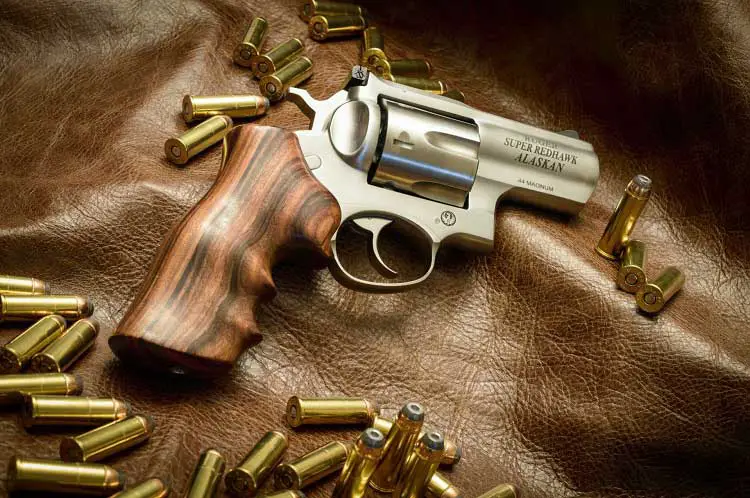
The 357 mag was first released in 1935 and was touted as the ultimate all-rounder when it came to calibers, and this title is still held today.
Its versatility makes it a popular choice for all kinds of settings, including self-defense, even if it is considered a little too fast and furious to be deployed safely at times.
Accuracy
When it comes to accuracy, you don’t get much better than the 357 magnum and it’s often regarded as one of the most precise.
What makes this a little different from the other self-defense calibers though, is that it can maintain this accuracy up to 100 yards and sometimes more, so people use them for everything from hunting to close-quarters combat.
Power
If power and penetration are your goals for a firearm, the 357 can deliver on both of these fronts.
However, because of its strength, you need to be careful when using it in a self-defense situation as its ability to penetrate through its target could be trouble for anyone standing behind them.
This sheer amount of force is why not as many people choose it for this type of setting unless they’re certain of how they will handle it.
Speed
Although the newer ballistics made for these rounds have slowed down a little, they’re still one of the fastest options out there.
With a standard 158 grain bullet, you’ll reach around 1200 feet per second with a 357 Magnum and over 1400 feet per second with a 125-grain load bullet.
#5 12 Gauge
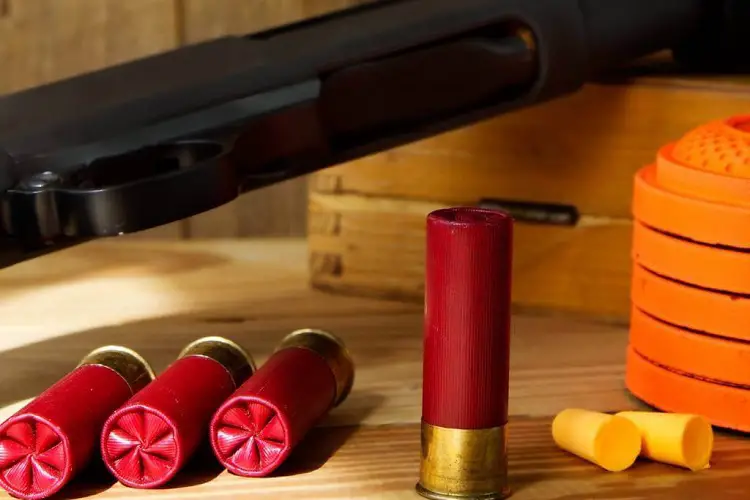
The 12 gauge shotgun is considered the do-it-all approach to these types of shotguns and is especially favored for home defense.
When it comes to self-defense and carrying a weapon on your person, they’re not recommended though, due to their sheer size and lack of maneuverability.
However, that doesn’t mean the 12 gauge doesn’t have a lot to offer still, especially in its ability to take down a target with ease.
Accuracy
Shooting a 12 gauge shotgun doesn’t require as much precision as a handgun, but that’s not to say you don’t have to try.
As the scatter pattern of the shot will ensure a wider space is hit, you still have to focus and practice with this caliber.
What makes it a popular choice where accuracy is concerned though, is that even newcomers with a little bit of training will still be able to fire a shot that can stop an intruder in their tracks.
Power
If you want something that’s got more power and impact per trigger pull, you can’t go past the 12 gauge shotgun.
This type of power makes it a formidable opponent and it’s part of what earned it the title of an all-rounder.
A 12 gauge has enough power for hunting, protecting your home, and even stopping garden pests, and everything in between.
Speed
A 12 gauge is pretty fast in the right conditions, with an average muzzle velocity of 1,250 feet per second that can rival any of the top-performing handgun calibers.
Another advantage of this faster exit velocity means its range is better as well, so you get a two-for-one deal when using this caliber for home defense.
The Right Round for Self Defense
The caliber of a gun is just as crucial to get right as the gun itself, and as we all have requirements and preferences in this regard, there’s no single solution to suit everyone.
Consider what each of these rounds offers in speed, power, and accuracy, then find the one that best suits your needs, and you’ll have the most effective self-defense tool for you.
Related Questions
The caliber that your firearm is chambered for will have a huge impact on what happens when you fire it, and in a potential life or death situation like when self-defense is needed, it is crucial.
If you still have questions about choosing the right gun and caliber for whatever purpose you need it, read on for a few more FAQs.
Is 9mm an Effective Self Defense Round?
The 9mm round is one of the most popular when it comes to self-defense, and is not only utilized by civilians, but by the police and other armed forces.
The benefits of the 9mm are that there are lots of handguns available in this caliber, it has higher magazine capacity, and they’re reliable and fast-acting when you need them to be.
What’s the Best Self Defense Rifle?
A rifle might not be the most common choice for self-defense but it is efficient for home defense, and if you want this type of gun, the .223 Remington/5.56 NATO is the most popular.
This cartridge is compatible with the AR-15 range and they’re powerful and dependable in a defensive situation.
Should I Carry a 45 or 9mm?
The .45 ACP is capable of delivering more impact resulting in a larger wound cavity, but when compared to a 9mm, it’s harder to shoot and won’t hold as many rounds.
The 9mm is generally the most popular option of the two but it’s up to the individual to decide on what caliber they’re more comfortable with.
Resources:
![5 Best Pellet Guns Under $100 [2023] 8 bb rifle gun](https://www.armorholdings.com/wp-content/uploads/2022/11/bb-rifle-gun.jpg)
